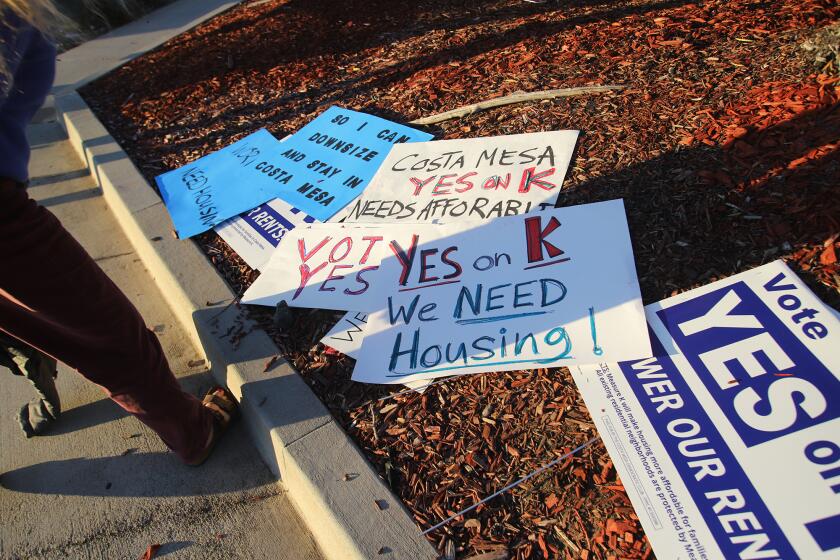L.A. judge denies Huntington Beach’s request to dismiss state’s housing lawsuit

- Share via
A Los Angeles County Superior Court judge Thursday denied Huntington Beach’s request to dismiss a state lawsuit accusing the city of falling out of compliance with a state housing mandate.
Judge James Chalfant reaffirmed his tentative ruling, published Wednesday, siding with the California attorney general’s office and Department of Housing and Community Development.
Chalfant disagreed with City Attorney Michael Gates’ argument that the plaintiffs should have taken legal action 90 days after HCD notified the city that it was out of compliance in June 2015. Gates cited a 90-day deadline established under a statute of limitations regarding low- or moderate-income housing projects.
At Gov. Gavin Newsom’s request in January, the state filed suit against Huntington Beach over what state officials described as the city’s failure to allow enough homebuilding to accommodate a growing population. The complaint cited the city’s Beach and Edinger Corridors Specific Plan.
According to Chalfant, the lawsuit fell under a different statute of limitations that permits parties to take action within a three-year window.
HCD also issued letters of noncompliance in 2016 and 2018.
“Arguably this is a continuing violation that could never be barred by any statute of limitation,” Chalfant wrote. “At most, it’s subject to ... three-year period, beginning from HCD’s discovery that the city would refuse to comply.”
Karen Naungayan, assistant director of external affairs for HCD, said in an email Thursday that “the Department of Housing and Community Development is pleased with the judge’s ruling and looks forward to the case being tried on its merits.”
A trial-setting conference is scheduled for Feb. 25.
Gates said Thursday that the City Council authorized him to appeal Chalfant’s decision, adding that the “rule of law must prevail.”
“We disagree with the court that, in essence, the state can bring a suit against a city at any time when the state believes the city is not compliant with state housing law,” Gates said. “The fact is, in government code Section 65009, the state Legislature imposed a 90-day window to challenge cities for legislative acts dealing with affordable housing.”
The attorney general’s office referred questions to HDC. The governor’s office did not return a message seeking comment.
Huntington Beach put itself in a 410-unit shortfall toward its state-mandated target for low-income housing units when the City Council in 2015 amended the Beach and Edinger Corridors Specific Plan, which was adopted in September 2013 to help revitalize Beach Boulevard and Edinger Avenue by streamlining the building approval process.
The amendments reduced the cap on new residential development from 4,500 units to 2,100 and imposed stricter height and setback requirements after many residents complained about the rate at which high-density residential projects were popping up. It also meant the city no longer had enough land zoned to accommodate low-income residents under state requirements.
Gates wrote a letter to HCD in March 2016 asking that the state drop its requirement that Huntington Beach add 1,353 low-income dwellings by 2021. The city had been given until September that year to identify sites for the housing in order to comply with state regulations.
“HCD is not challenging any action or decision by the city to adopt or revise its housing element, but rather is challenging the city’s failure to bring the 2013 housing element into compliance with the housing element law,” Chalfant wrote in his tentative ruling. “HCD does not challenge what the city has done, but what it has not done.”
Gates has said the city has been and continues to work with HCD through a different lawsuit in which the Kennedy Commission, an affordable-housing advocacy group that sat in during Thursday’s hearing, alleged the Beach-Edinger amendments violated state housing law.
Gates told Chalfant that the state’s lawsuit interrupted the city’s work with HCD and the Kennedy Commission.
In the Kennedy Commission lawsuit, Chalfant sided with the group in 2015, but that decision was overturned in 2017 by a panel of the California 4th District Court of Appeal.
The Kennedy Commission appealed to the state Supreme Court, which declined to review the case.
All the latest on Orange County from Orange County.
Get our free TimesOC newsletter.
You may occasionally receive promotional content from the Daily Pilot.





